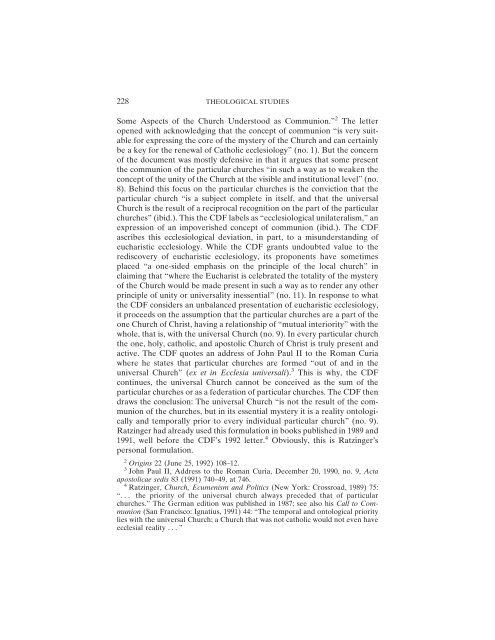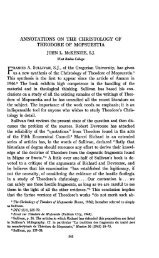the ratzinger/kasper debate - Theological Studies
the ratzinger/kasper debate - Theological Studies
the ratzinger/kasper debate - Theological Studies
Create successful ePaper yourself
Turn your PDF publications into a flip-book with our unique Google optimized e-Paper software.
228 THEOLOGICAL STUDIES<br />
Some Aspects of <strong>the</strong> Church Understood as Communion.” 2 The letter<br />
opened with acknowledging that <strong>the</strong> concept of communion “is very suitable<br />
for expressing <strong>the</strong> core of <strong>the</strong> mystery of <strong>the</strong> Church and can certainly<br />
be a key for <strong>the</strong> renewal of Catholic ecclesiology” (no. 1). But <strong>the</strong> concern<br />
of <strong>the</strong> document was mostly defensive in that it argues that some present<br />
<strong>the</strong> communion of <strong>the</strong> particular churches “in such a way as to weaken <strong>the</strong><br />
concept of <strong>the</strong> unity of <strong>the</strong> Church at <strong>the</strong> visible and institutional level” (no.<br />
8). Behind this focus on <strong>the</strong> particular churches is <strong>the</strong> conviction that <strong>the</strong><br />
particular church “is a subject complete in itself, and that <strong>the</strong> universal<br />
Church is <strong>the</strong> result of a reciprocal recognition on <strong>the</strong> part of <strong>the</strong> particular<br />
churches” (ibid.). This <strong>the</strong> CDF labels as “ecclesiological unilateralism,” an<br />
expression of an impoverished concept of communion (ibid.). The CDF<br />
ascribes this ecclesiological deviation, in part, to a misunderstanding of<br />
eucharistic ecclesiology. While <strong>the</strong> CDF grants undoubted value to <strong>the</strong><br />
rediscovery of eucharistic ecclesiology, its proponents have sometimes<br />
placed “a one-sided emphasis on <strong>the</strong> principle of <strong>the</strong> local church” in<br />
claiming that “where <strong>the</strong> Eucharist is celebrated <strong>the</strong> totality of <strong>the</strong> mystery<br />
of <strong>the</strong> Church would be made present in such a way as to render any o<strong>the</strong>r<br />
principle of unity or universality inessential” (no. 11). In response to what<br />
<strong>the</strong> CDF considers an unbalanced presentation of eucharistic ecclesiology,<br />
it proceeds on <strong>the</strong> assumption that <strong>the</strong> particular churches are a part of <strong>the</strong><br />
one Church of Christ, having a relationship of “mutual interiority” with <strong>the</strong><br />
whole, that is, with <strong>the</strong> universal Church (no. 9). In every particular church<br />
<strong>the</strong> one, holy, catholic, and apostolic Church of Christ is truly present and<br />
active. The CDF quotes an address of John Paul II to <strong>the</strong> Roman Curia<br />
where he states that particular churches are formed “out of and in <strong>the</strong><br />
universal Church” (ex et in Ecclesia universali). 3 This is why, <strong>the</strong> CDF<br />
continues, <strong>the</strong> universal Church cannot be conceived as <strong>the</strong> sum of <strong>the</strong><br />
particular churches or as a federation of particular churches. The CDF <strong>the</strong>n<br />
draws <strong>the</strong> conclusion: The universal Church “is not <strong>the</strong> result of <strong>the</strong> communion<br />
of <strong>the</strong> churches, but in its essential mystery it is a reality ontologically<br />
and temporally prior to every individual particular church” (no. 9).<br />
Ratzinger had already used this formulation in books published in 1989 and<br />
1991, well before <strong>the</strong> CDF’s 1992 letter. 4 Obviously, this is Ratzinger’s<br />
personal formulation.<br />
2 Origins 22 (June 25, 1992) 108–12.<br />
3 John Paul II, Address to <strong>the</strong> Roman Curia, December 20, 1990, no. 9, Acta<br />
apostolicae sedis 83 (1991) 740–49, at 746.<br />
4 Ratzinger, Church, Ecumenism and Politics (New York: Crossroad, 1989) 75:<br />
“. . . <strong>the</strong> priority of <strong>the</strong> universal church always preceded that of particular<br />
churches.” The German edition was published in 1987; see also his Call to Communion<br />
(San Francisco: Ignatius, 1991) 44: “The temporal and ontological priority<br />
lies with <strong>the</strong> universal Church; a Church that was not catholic would not even have<br />
ecclesial reality . . . ”

















